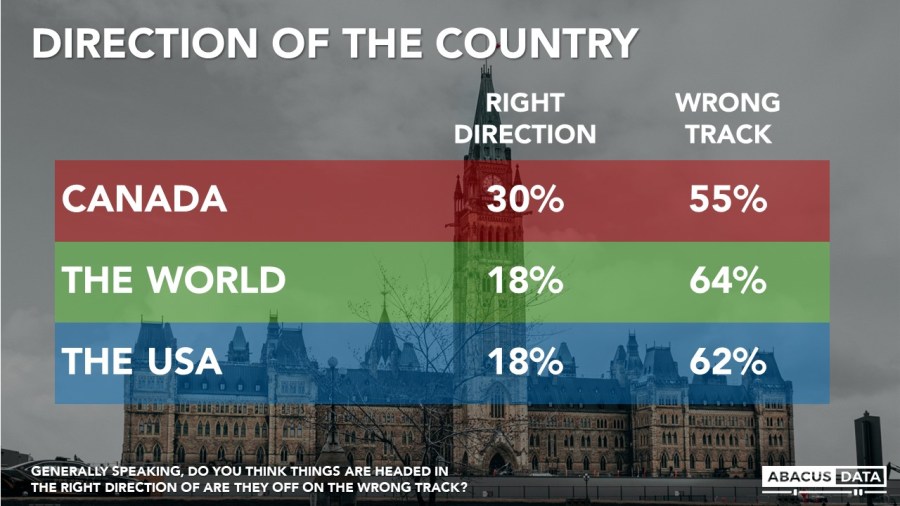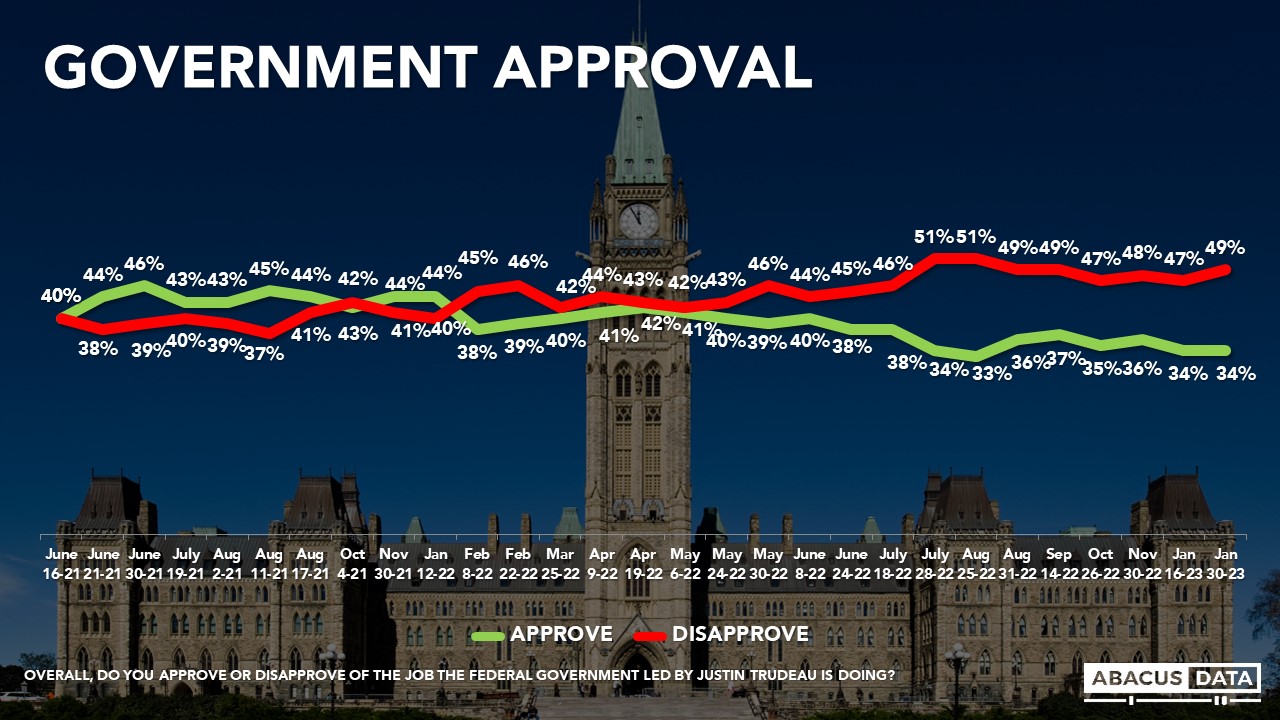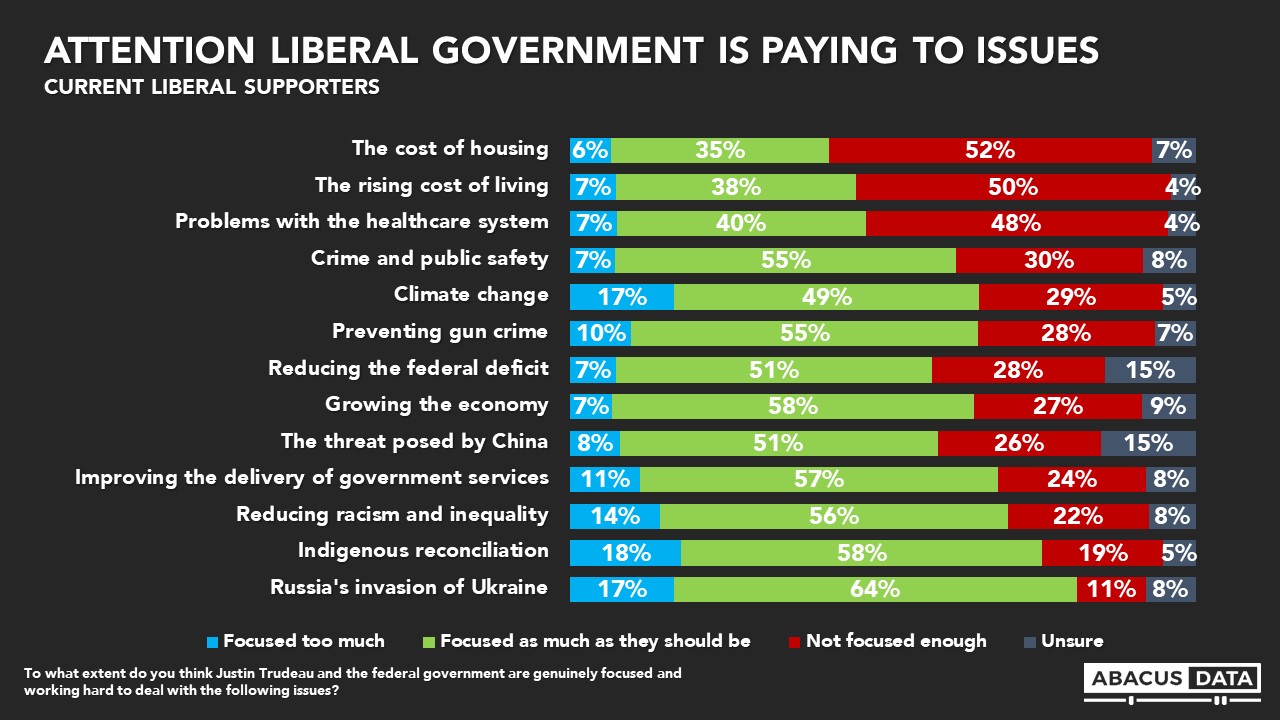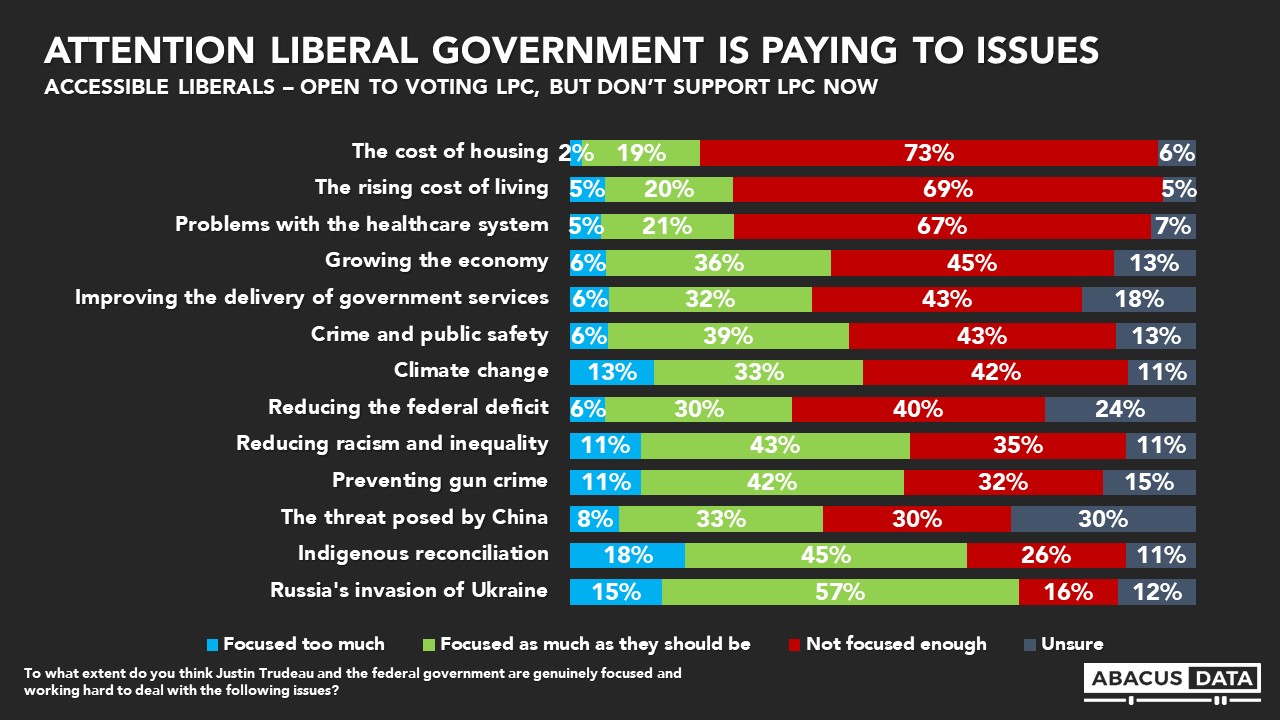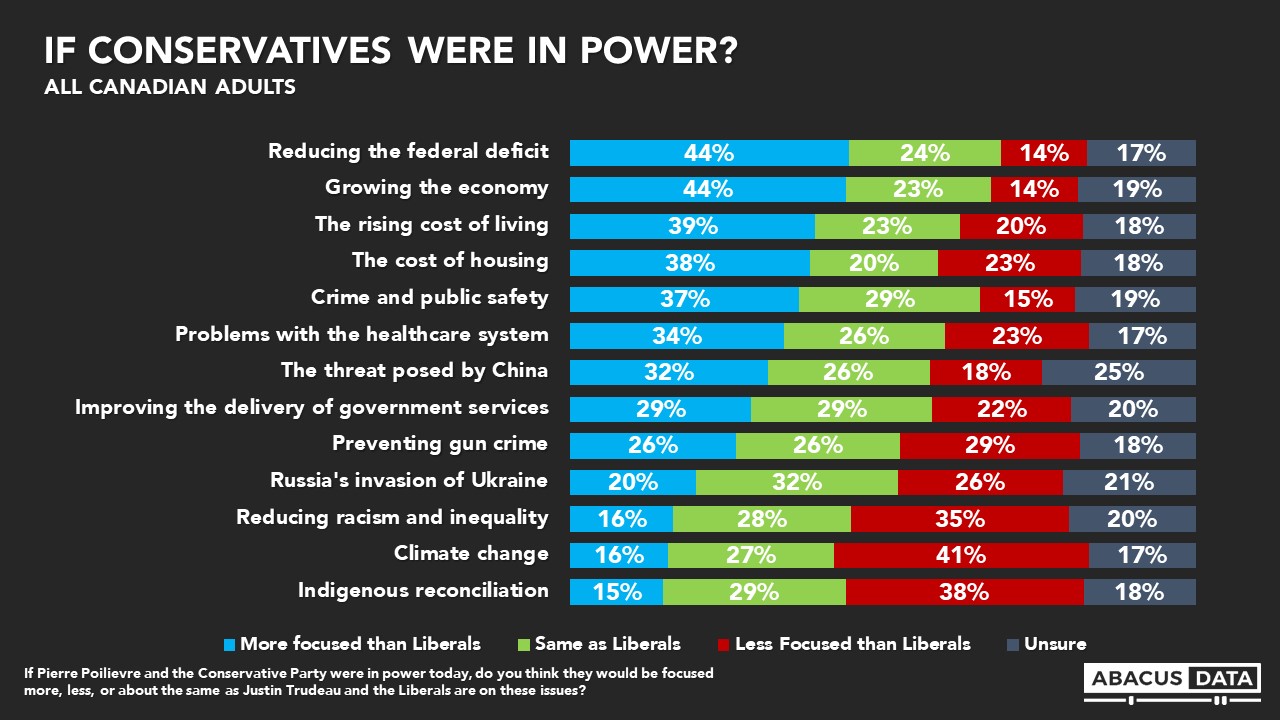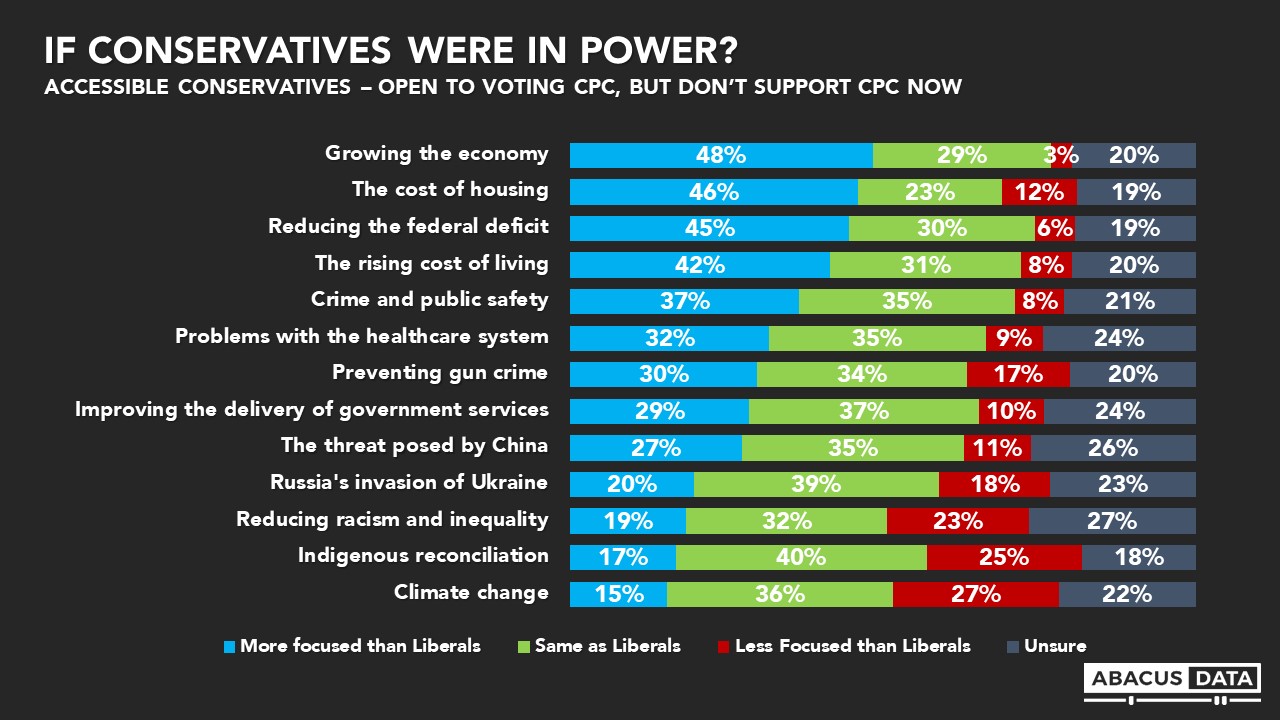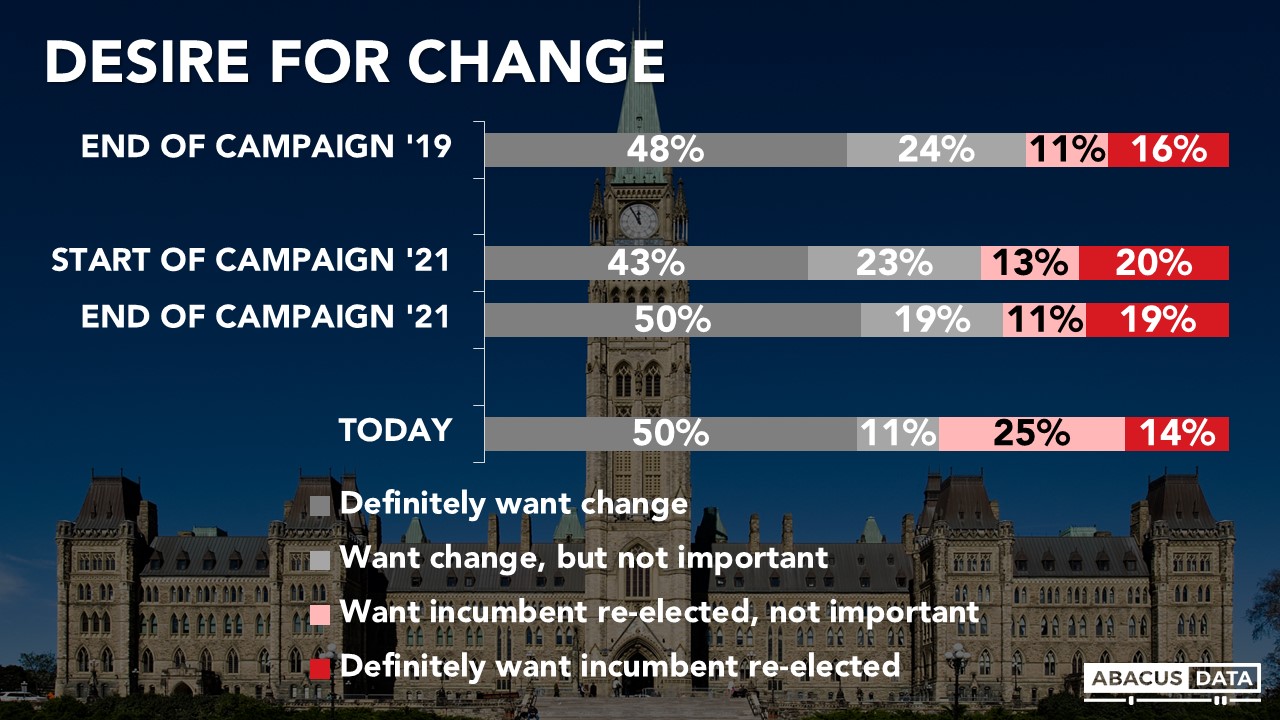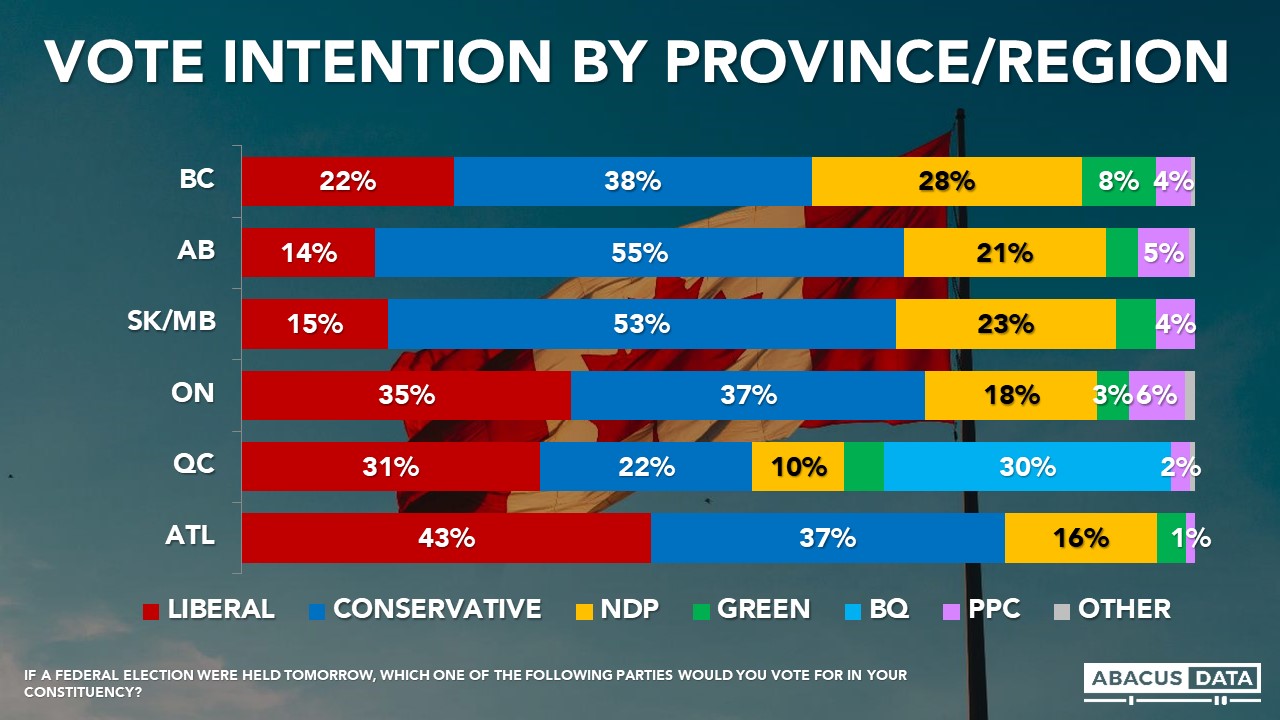Conservatives open up an 8-point lead over the Liberals as 70%+ Canadians don’t think the Liberal government is focused enough on the cost of living, healthcare or housing.
February 1, 2023
From January 27 to 30, 2023, Abacus Data conducted a nationally representative survey of 1,500 Canadian adults. The survey asked several questions about the political landscape that we track as part of our regular national omnibus surveys.
Here’s what we found:
THE PUBLIC MOOD CONTINUES TO WORSEN
Today, fewer Canadians think the country is headed in the right direction than at any point in the past three years. 30% think things are going in the right direction while more than half think things are off on the wrong track. Canadians are even less optimistic about the direction of the United States or the world overall.
SATISFACTION WITH FEDERAL GOVERNMENT LARGELY UNCHANGED
Today, 34% approve, and 49% disapprove of the performance of the federal government, a two-point rise in disapproval since earlier this month. Disapporval of the government has hovered between 47% and 51% since the summer of 2022.
PUBLIC PERCEPTIONS ABOUT THE LIBERAL GOVERNMENT’S FOCUS
In this survey, we asked Canadians whether they felt the Liberal government was focused too much, as much as they should be, or not focused enough on several issues.
The objective was to understand how well the government is aligning with the public’s priorities.
Given that the Liberals need only about 40% of the popular vote to win a majority government in our electoral system, a result lower than 35% to 40% in the “focused as much as they should be” category should be considered an area of vulnerability for the Liberals. On that measure, the Liberals are believed to be not focusing enough on the rising cost of living, the cost of housing, healthcare, growing the economy, reducing the deficit, improving public services, and the threat posed by China.
The government is closer to an equilibrium on climate change, crime and public safety, reducing racism and inequality, indigenous reconciliation, and the Russian invasion of Ukraine.
When we focus only on current Liberal supporters, we find a similar pattern. Close to half of Liberal supporters (those who say in our survey they would vote Liberal today) think the government isn’t focused enough on the rising cost of living, the cost of housing, and the healthcare system. On other issues, the proportion who don’t think it’s focused enough falls to 30% or below.
Among another group of the electorate – accessible Liberals – we see the same kind of result. A large majority of accessible Liberals don’t think the government is focused enough on housing, the cost of living, or healthcare. Over 40% don’t think it’s focused enough on growing the economy, improving public services, or crime and public safety.
WHAT IF THE CONSERVATIVES WERE IN POWER? ISSUE FOCUS
We then asked Canadians whether they thought Pierre Poilievre and the Conservatives would focus more, less, or about the same as the Liberals on the same set of issues.
Again, if 35% or more think the Conservatives would focus on the issue more than the Liberals, that would be an effective “sword issue” for the Conservatives. If a similar number feel they would focus on that issue less, that would suggest a “shield issue” for the opposition.
For the Conservatives, Canadians are more likely to believe they would focus more than the Liberals on reducing the deficit, growing the economy, dealing with the cost of living, the cost of housing, and public safety. In contrast, more think they would be less focused than the Liberals on indigenous reconciliation, climate change, and reducing racism and inequality.
Among accessible Conservatives – those open to voting Conservative but don’t support the party now – over 40% think the party would be more focused than the Liberals are on the economy, housing, reducing the deficit and reducing the cost of living.
This analysis is helpful to understand how issue salience may impact voting behaviour in the future. If voters are focused on the economy or the cost of living, the Conservatives are likely to benefit as many swing voters think they will focus more on that issue than the Liberals and many feel the Liberals aren’t focused enough on those issues.
DESIRE FOR CHANGE SIMILAR TO THE END OF THE 2021 ELECTION
Despite Canadians being more anxious about the direction of the country, the desire for change is holding steady and is in line with the end of the 2021 campaign. 50% of Canadians definitely want a change of government while 14% definitely want the Liberals re-elected. The five-point drop in those who definitely want to see the Liberals re-elected is noteworthy however and confirms other data that shows a decrease in enthusiasm for the Liberal government and Prime Minister Trudeau specifically.
FEELINGS ABOUT THE PM TRENDING NEGATIVELY
Public feelings about Prime Minister Trudeau have remained relatively stable over the past few months although the trend is a slight rise in negatives. Today, the Prime Minister’s net favourable rating is -19 with 31% having a positive impression and 50% having a negative impression of him. Among Liberal supporters, his net rating is +75.
JAGMEET SINGH’S DISSAPPROVAL HITS A NEW HIGH; BUT HE’S VERY POPULAR WITH NDP SUPPORTERS
For the last couple of years, Jagmeet Singh has been the most popular of the federal leaders, at one time his net rating was +21 (46% positive/25% negative). Since then, his positives have slid, and his negatives risen to the point today where there are equal numbers who have a positive and negative impression of Singh. This is the first time ever in our tracking that Singh’s net favourable is not positive. Among NDP supporters, his net rating is +84.
PIERRE POILIEVRE: ONE-THIRD POSITIVE, ONE-THIRD NEGATIVE, & ONE-THIRD NEUTRAL
Over the past month, impressions of Pierre Poilievre have not changed much. His negatives are down a single point while his positives are up two points. His net favourable rating is -3. Another 21% have a neutral view of the Conservative leader while 12% say they don’t know enough about him to have a view. Among Conservative supporters, his net rating is +70.
FEDERAL VOTE INTENTION
If an election were held today, 37% would vote for the Conservative Party (up 2 since earlier this month), 29% for the Liberal Party (down 2), 18% for the NDP and 7% for the BQ. Since the 2022 election, support for the Liberal Party is down 4 while the Conservatives have gained 3 points.
The Conservatives are ahead in British Columbia, Alberta, Saskatchewan, and Manitoba. The Conservatives also have a small 2-point advantage in Ontario. In Quebec, the Liberals and BQ are tied with the Conservatives in third at 22%.
This is the largest lead we have measured for the Conservatives since the 2015 election.
UPSHOT
 According to David Coletto: “Over the past few weeks the opinion environment has become more hostile to the federal Liberals. More think the country is headed in the wrong direction than at any point in the past few years, 50% have a negative impression of the Prime Minister, and large majorities don’t feel the Liberal government is focused enough on the most important issues of the day – inflation, housing, and healthcare.
According to David Coletto: “Over the past few weeks the opinion environment has become more hostile to the federal Liberals. More think the country is headed in the wrong direction than at any point in the past few years, 50% have a negative impression of the Prime Minister, and large majorities don’t feel the Liberal government is focused enough on the most important issues of the day – inflation, housing, and healthcare.
The effect is that the Conservatives have opened up the biggest vote intention lead since the Liberals were elected in 2015 with large leads in the West while being competitive in Ontario and Atlantic Canada. The Liberal lead in Quebec we measured a few weeks is now gone.
This Conservative lead is more about dissatisfaction with the Liberals than enthusiasm for the Conservatives. Pierre Poilievre’s personal image has neither improved nor deteriorated – perhaps a win given the environment. But he’s benefiting from a Liberal brand that’s suffering from a weakened anchor (the Prime Minister and Liberal Leader) and deteriorating issue ownership.
The NDP’s vote share is holding steady at 18% despite Jagmeet Singh’s negatives continuing to rise. This is the first time ever that his net favourables are not positive. His support for the Liberal government has all but erased any goodwill that Conservative-oriented Canadians had for Mr. Singh. Not likely an issue for the party but his long-term hold on the title of Canada’s most popular national leader is now in doubt. However, Mr. Singh continues to hold the title of “most liked by his own party” with a net rating of +84 (Trudeau +75, Poilievre +70).
For the Liberals, these numbers should be a warning that they are losing the empathy game. Many Canadians – including their own supporters – don’t think they are focused enough on the core pocketbook issues and the crisis in healthcare that are occupying people’s attention. Turning that perception around should be job number one for the government.”
METHODOLOGY
The survey was conducted with 1,500 Canadian adults from January 27 to 30, 2023. A random sample of panelists were invited to complete the survey from a set of partner panels based on the Lucid exchange platform. These partners are typically double opt-in survey panels, blended to manage out potential skews in the data from a single source.
The margin of error for a comparable probability-based random sample of the same size is +/- 2.6%, 19 times out of 20.
The data were weighted according to census data to ensure that the sample matched Canada’s population according to age, gender, educational attainment, and region. Totals may not add up to 100 due to rounding.
This survey was paid for by Abacus Data Inc. in partnership with the Toronto Star.
Abacus Data follows the CRIC Public Opinion Research Standards and Disclosure Requirements that can be found here: https://canadianresearchinsightscouncil.ca/standards/
ABOUT ABACUS DATA
We are the only research and strategy firm that helps organizations respond to the disruptive risks and opportunities in a world where demographics and technology are changing more quickly than ever.
We are an innovative, fast-growing public opinion and marketing research consultancy. We use the latest technology, sound science, and deep experience to generate top-flight research-based advice to our clients. We offer global research capacity with a strong focus on customer service, attention to detail, and exceptional value.
We were one of the most accurate pollsters conducting research during the 2021 Canadian election following up on our outstanding record in 2019.
Contact us with any questions.
Find out more about how we can help your organization by downloading our corporate profile and service offering.

